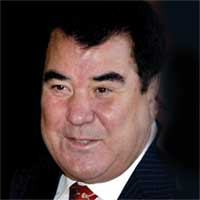
INTEREST REBOUNDS IN TRANS-CASPIAN PIPELINE FOR TURKMEN GAS
INTEREST REBOUNDS IN TRANS-CASPIAN PIPELINE FOR TURKMEN GAS
Russia’s New Year “gas attack” on Ukraine and its impact on gas supplies Europe-wide has suddenly reawakened interest in obtaining direct access to the gas reserves of Turkmenistan. Such interest reemerged even before the second round of Russian gas supply shortfalls to Europe in the second half of January, caused this time by severe cold in Russia itself, confirmed the risks of unduly heavy reliance on that source. So has the January 22 sabotage of Russian export pipelines in the North Caucasus (see EDM, January 23). This series of events is now causing even the European Union to take cognizance of Turkmenistan’s vast reserves of gas within Europe’s reach.
Turkmenistan extracted 63 billion cubic meters of gas in 2005. Existing pipeline capacity allowed the export of 45 billion cubic meters, including some 40 billion to and via Russia. Turkmen President Saparmurat Niyazov has set an extraction target of 80 billion cubic meters in 2006. (Turkmenistan.ru, Interfax, January 11). This and higher targets seem entirely realistic, contingent on relatively modest investments. The question is whether Turkmen gas supplies will increase Russia’s strategic leverage as monopolistic transporter and re-exporter of Turkmen gas, or will on the contrary enable Europe to resist such leverage by opening direct access to the Turkmen gas.
The United States and Turkey, originators of the 1997-2000 trans-Caspian gas pipeline project to supply Turkmen gas to Turkey and Europe, are moving first to reactivate that idea.
On January 13, U.S. Deputy Assistant Secretary of State Matthew Bryza conferred with Niyazov’s in Ashgabat on ways to “help Turkmenistan export its huge energy resources to the international community” and “how to enhance competition on European energy markets” (Turkmen Television, January 13). Translation: how to de-monopolize the transit of gas from Turkmenistan.
On January 20, Turkish Energy and Mineral Resources Minister Hilmi Guler discussed with Niyazov in Ashgabat the resumption of “previously negotiated projects on gas supplies by pipeline to Turkey.” While the Turkish gas market is oversubscribed, Guler apparently suggested two ways around that obstacle: first, setting the price of Turkmen gas lower than the European-level price of gas now reaching Turkey; and, second and principally, using Turkey not as a primary market for Turkmen gas but rather as an “energy bridge” to Europe. Guler described Niyazov’s reaction to these suggestions as an “affirmative attitude” (Turkmen Television, January 20; Zaman, January 21).
On January 22-23, Niyazov paid a working visit to Moscow for discussions with President Vladimir Putin and Gazprom chairman Alexei Miller on energy issues. Prior to Niyazov’s visit, officials in Ashgabat had publicly indicated that Turkmenistan would ask for a price increase on its gas, from $60 to $80 or $85 per 1,000 cubic meters, in line with the rise of international prices for energy. On the visit’s eve, however, Turkmenistan’s Moscow embassy denied that information as a rumor intended to spoil the atmosphere of Niyazov’s meeting with Putin. Apparently, Niyazov had blinked — or decided to postpone the demand until later this year, preparatory to the 2007 supply contracts. Russian and Turkmen official accounts of the visit are tight-lipped. They merely speak of bilateral cooperation in transport and delivery of Turkmen gas in the “eastern and western sectors” — i.e., for Russia’s use and for re-export via Russia (Interfax, Turkmenistan.ru, Turkmen Television, January 23).
The lion’s share of Turkmen gas is earmarked for Ukraine via Russia, thus releasing corresponding volumes of Russian gas for sale at high prices in Europe. Moscow seeks to tap even more deeply into Turkmenistan’s reserves for use in Russia itself or re-export to Europe as “Russian” gas, pocketing the price differential in this process as well as aggravating Europe’s dependency.
Unusually, while in Moscow, Niyazov received Ukraine’s Fuel and Energy Minister Ivan Plachkov and Naftohaz Ukrainy chairman Oleksiy Ivchenko. The sides agreed to begin in the near future meeting in a tripartite format among the heads of Gazprom, Naftohaz, and Turkmennebitgaz, in order to discuss further projects. Plachkov and Ivchenko also renewed President Viktor Yushchenko’s invitation to Niyazov to visit Kyiv — an invitation that Yushchenko has repeatedly extended since May 2005.
Kyiv is concerned about first-quarter supplies of Turkmen gas. Under the Russia-Turkmenistan contract signed in December 2005, Russia has pre-empted 15 billion cubic meters in imports from Turkmenistan just for January-March 2006. The Russia-Ukraine agreement signed on January 4, 2006 would in effect transfer that volume to Ukraine; but this agreement is not yet valid, and is being sharply criticized in Ukraine for many aspects unrelated to the first-quarter supplies (Interfax-Ukraine, UNIAN, Turkmenistan.ru, Turkmen Television, January 22, 23).
The obvious solution in Ukraine’s and overall Western interest is going ahead with the trans-Caspian project. Official Kyiv, however, does not seem to be working toward that goal.


